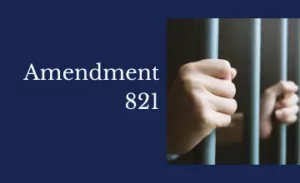
Criminal justice reform in the United States legal system is underway and the recent Federal Sentencing Amendment 821 stands as a notable milestone, reflecting a concerted effort to address disparities and promote fairness within the federal criminal sentencing system. Enacted in response to growing concerns over inequities in sentencing, this amendment aimed to recalibrate the system’s approach to penalties for certain offenses.
The criminal justice system has long grappled with issues of disproportionality, especially in terms of sentencing for non-violent offenses and drug-related crimes. Mandatory minimum sentences, which were enacted in the 1980s and 1990s, contributed significantly to the increasing prison population and exacerbated racial and socioeconomic disparities in the system. These policies often resulted in harsh penalties, disproportionately affecting minorities and individuals from lower-income backgrounds.
Recognizing these systemic flaws, Federal Sentencing Amendment 821 has emerged as a response to reevaluate sentencing guidelines and prioritize fairness and proportionality in punishment. One of its primary objectives is to grant federal judges greater discretion in sentencing for certain non-violent offenses, allowing them to consider individual circumstances and depart from mandatory minimums in appropriate cases
The amendment seeks to introduce a more nuanced approach to sentencing, enabling federal judges to consider factors beyond the nature of the offense itself. By allowing consideration of mitigating factors such as an individual’s role in the offense, their criminal history, and the potential for rehabilitation, Amendment 821 is aimed to promote more just and tailored sentencing outcomes.
Moreover, the amendment emphasizes a shift toward rehabilitation and reintegration rather than strict punitive measures, including incarceration, for certain non-violent offenses. This shift aligns with evolving perspectives on criminal justice, recognizing that incarceration should not solely serve as a punitive measure but also as an opportunity for a convicted person’s rehabilitation and eventual re-entry into society.
However, it’s important to note that while Amendment 821 marked a positive stride towards reform, it represents just one piece of the broader puzzle in reforming the criminal justice system. The amendment’s impact is varied across different jurisdictions and cases, and its effectiveness is subject to interpretation and implementation by judges.
Additionally, ongoing discussions persist regarding the need for even further reforms to address remaining disparities, ensure consistent application of the law, and promote a more comprehensive approach to criminal justice. Discussion on issues such as mandatory minimums for offenses and the intersection of race and sentencing disparities continue between lawmakers and advocates.
Federal Sentencing Amendment 821 stands as a testament to the acknowledgment of flaws within the system and the willingness to adapt and evolve towards a more equitable and just framework. It does represents critical step in the ongoing journey towards a fairer and more balanced federal sentencing system, emphasizing the importance of individualized justice and the recognition of diverse circumstances in sentencing.
As discussions and efforts for criminal justice reform persist at the national level, the legacy of Amendment 821 serves as a reminder of the need to continuously assess and refine the United States criminal justice system, ensuring that justice remains not just a concept, but a tangible reality for all individuals.
Related Information:
Amendment 821
Hiring An Attorney for Amendment 821
United States Sentencing Commission Amendment 821 Compilation



